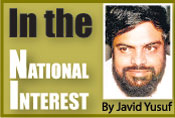Recent Sri Lankan history has been characterized by a serious crisis in governance which has prevented the country from realizing its true potential.
While the infirmities of the political leadership have played a big part in Sri Lanka's abortive attempts to move forward and provide its people with a decent lifestyle, systemic flaws have contributed, in no small measure, to the failures in governance.
One such flaw is the Executive Presidential System introduced by the J.R. Jayewardene Constitution of 1978.
It has always been this writer's view that while the 'reform' of this system will not guarantee an overnight change in the quality of governance, it will undoubtedly facilitate good governance for Sri Lanka and its people.
President Jayewardene who conceptualised and institutionalised the Executive Presidency described it as one that 'would not be subject to the whims and fancies of Parliament'. In a democracy, Parliament is made up of elected representatives of the sovereign people. It is through Parliament that the people exercise their power to govern themselves.
In the scheme of things of the 1978 Constitution, the Executive President is thus insulated from the people virtually giving the holder of the office a free hand to do as he pleases without having to consider the views of the voters who elected him.
Thus the Executive Presidency is by its very definition 'anti democratic'. When the enormous powers vested in the Executive Presidency, taken together with the immunity attached to it, are examined, it is self evident that the very concept is the very antithesis of democracy.
At the time the 1978 Constitution was being enacted, left leaders like Dr. N.M. Perera and Dr. Colvin R. de Silva drew attention to the authoritarian nature of the Executive Presidency and the consequent dangers to the democratic character of the State.
But as is generally the case wise words are never heeded by politicians and it has taken more than three decades of the Executive Presidency for politicians across the political divide to arrive at that elusive consensus and conclude that the Executive Presidency must go.
Objectively speaking, Sri Lanka's experience of the Executive Presidency has been an unmitigated disaster with the period of its existence being described as the worst period in post-independent history. It has also disempowered Parliament creating a category of servile, sycophantic, opportunistic politicians without any vision who are unable to make any meaningful contribution to the formulation of national and legislative policy.
Under the Westminster system the Prime Minister has to come to Parliament and answer questions and defend government policy. He has the opportunity to interact with members of Parliament of all political hues and be exposed to a wide range of views which help him to keep his feet on the ground.
Our experience of the Executive Presidency has been one where the incumbent is more influenced by advisors and others who are not accountable to the people while the Cabinet is often reduced to rubber stamping the President's views.
Another myth that helped perpetuate the Executive Presidency was the mistaken notion that it helped the minorities. But finally the bubble seems to have burst and minority opinion has come round to the view that in fact more harm than good has come out of this institution.
While now there seems to be agreement for the need to abolish (not reform) the Executive Presidency, there is a polarization of views when it comes to the actual implementation. The difference of opinion seems more based on political expediency rather than national interest.
What is even more alarming is the fact that some well meaning and some not-so-well-intentioned analysts with their own agendas are trying to disturb the consensus by speaking of purported virtues of the Executive Presidency. They claim that the LTTE could not have been defeated if not for the Executive Presidency, forgetting that even greater wars like the World Wars have been won by collective leaderships rather than individual-centred leaderships.
Then again even if it is true that the Executive Presidency helped to win the war, why do we need this institution now that the war is over and a similar aberration is not likely to occur unless we ourselves are successful in messing up and creating the conditions for any form of armed uprising?
The National Interest demands that the Executive Presidency is abolished and the sooner it is done the better. Even though the Presidential Election process has started, it is even now not too late for the Government to ask for the Opposition's support to abolish the Presidency without holding the Election scheduled for January 26. It will save the country a great deal of money and prevent a great deal of unproductive acrimonious bad blood between the main candidates and their supporters. |

